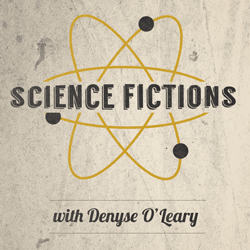 Life Sciences
Life Sciences
Does Nature Just “Naturally” Produce Life?
 MIT physicist Jeremy England offered the world a math formula a couple of weeks ago to explain how life forms. A group of atoms immersed in heat sources often restructures itself, to dissipate energy: “This could mean that under certain conditions, matter inexorably acquires the key physical attribute associated with life,” namely complex order.
MIT physicist Jeremy England offered the world a math formula a couple of weeks ago to explain how life forms. A group of atoms immersed in heat sources often restructures itself, to dissipate energy: “This could mean that under certain conditions, matter inexorably acquires the key physical attribute associated with life,” namely complex order.
“Inexorably”? England proposes that the laws of nature cause life to form and evolve, just as they cause planets to form and capture moons: “You start with a random clump of atoms, and if you shine light on it for long enough, it should not be so surprising that you get a plant.” Even if the plant is “inexorable,” as he says, it would still surprise us. We do not tend to think we live in that kind of a universe.
If we knew of a hundred planets with confirmed life forms, we could investigate whether a single set of natural laws governs the circumstances under which these forms come into existence, and what those laws might be. But we have only one planet’s worth. That makes it tricky to address basic research questions such as whether different chemical bases for life would be viable. A responsible estimate of the likelihood of life on other planets, for example, depends in part on how Earth-like a planet must be in order to support life. But we really have no way of knowing. NASA found itself mocked in 2011 over irreproducible claims about arsenic-based life. Chlorine-based life fared likewise, but more quietly. Thus, so far, our sample is still one.
Law-based approaches have been gaining ground anyway, powered in large part by ambitious rhetoric. Biochemist Christian de Duve (1917-2013), a Nobelist (1974), argues that “… life is an obligatory manifestation of matter, bound to arise where conditions are appropriate.” Indeed, it is “a cosmic imperative. The universe is awash with life.” Not because there is any underlying divine order or meaning but because
Naturalism has not reached the limits of its explanatory power. On the contrary, everything that has been accomplished so far encourages the belief that the origin and evolution of life are, just as are life’s fundamental mechanisms, explainable in naturalistic terms. Research guided by this assumption remains a valid and promising approach to these problems.1
Some find de Duve’s approach not only promising, but preferred. Biophysicist Harold Morowitz told New Scientist that his own theory (metabolism first) is “part of a quiet paradigm revolution going on in biology in which the radical randomness of Darwinism is being replaced by a much more scientific law-regulated emergence of life.”
How can Morowitz and other law proponents just dispense with Darwin at a time when doubting him has cost many scientists their jobs? It’s because law proponents make clear that their alternative is as strictly naturalistic as the chance one. Because they are not arguing that humans were designed for a purpose, they can even argue, without generating career-limiting controversy, that intelligent life — as opposed to life generally — probably evolved only once, on this planet: “It required a kind of industrial revolution in terms of energy production,” says one. Splitting the difference between law and chance, origin-of-life researcher Nick Lane thinks that life of some kind would probably emerge on any wet, rocky planet, but that “complex” life forms are a matter of chance.
Essentially, law theorists assert that a chance origin of life is hopelessly improbable. Therefore, they assume, matter simply forms itself into life at some point, obedient to a law of its nature. The theorists do not at present have any idea what factors underlie such a law or how it has worked. Or why it is not working now, so far as we know (in the sense that new types of life are not self-assembling around us). They know that the law exists because life exists, chance is powerless to create it, and devotion to the philosophy of naturalism rules out design.
It might be helpful to think of the origin of life in terms of probability. Probability can be represented as a scale from 0 to 1. Events at 0 cannot happen and events at 1 must happen. For an event that has not happened, we face all the gradations of probability in between.
The past is different. Event 0 did not happen but Event 1 did. Life is Event 1. However, the probability of life coming into existence by any of the specific series of sub-events currently envisioned (never mind demonstrated) is at or near Event 0. This is not an easy problem.
At this point, assuming we still think the origin of life researchable, we can adopt one of the two permitted naturalist approaches: The law approach outlined above starts with Event 1 and delves into the fundamentals of physics and chemistry, hoping, along with England and Morowitz, to find something basic and comprehensive. But it is far from obvious where we should look.
Alternatively, we can join the partisans of chance. We can construct scenarios involving lucky spews from undersea volcanoes or random encounters with rare elements. Chance theories of the origin of life generate almost unlimited creative ideas compared to law-based ones. The world of ideas near 0 is, as we shall see, densely populated.
References:
(1) Christian de Duve, “Mysteries of Life”, in Bruce L. Gordon and William A. Dembski, The Nature of Nature: Examining the Role of Naturalism in Science (Wilmington, DE: ISI Books, 2011), p. 355.
Editor’s note: Here is the “Science Fictions” series to date at your fingertips .
